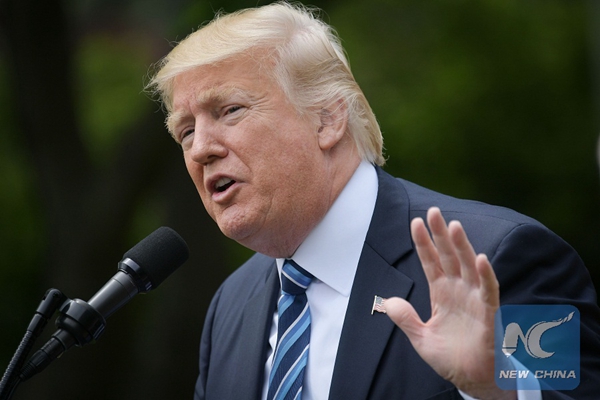Trump's rendezvous with Islam
- By Sajjad Malik
 0 Comment(s)
0 Comment(s) Print
Print E-mail China.org.cn, May 19, 2017
E-mail China.org.cn, May 19, 2017
|
|
|
Trump has approved the supplying of weapons to Kurdish forces battling the Islamic State group in Syria, a US official said on May 9, 2017. The funding "to provide support to the YPG has been approved," the official said on condition of anonymity. [Xinhua/AFP Photo] |
In his first grand introduction with the Muslim world and Islam, President Donald Trump has chosen Saudi Arabia - a highly symbolic gesture, as the country is home to the two holiest mosques of Islam.
It is also Trump's first ever foreign trip since taking office in January when over the weekend he meets a group of Muslim leaders during the three unique summits.
The first summit is between Saudi Arabia and United States and will focus on bilateral ties. The second is regional and Trump will sit with leaders of six-member Gulf Cooperation Council (GCC). The third provides a grand occasion for Trump to meet leaders and representatives of over 50 Muslim countries at the Arab-Islamic-American summit.
According to reports in Saudi media, Donald Trump will give a speech on Islam to the Muslim leaders. The summit leaders will discuss combating extremism and cracking down on illicit financing under the summit slogan: "Together we prevail."
He will join King Abdullah II of Jordan, Twitter CEO Jack Dorsey, U.S. Secretary of State Rex Tillerson, Pakistani Nobel Laureate Malala Yousafzai and others for a discussion on fighting extremism and terrorism in the digital age.
In hindsight, what a transformation. Once Donald Trump blamed Muslims for all ills in the world and was eager to ban their entry in the United States. And here he is out on his first foreign venture to Saudi Arabia, the country blamed by many American and Western experts at the center of "promoting and patronizing radical Islam."
Trump's predecessor Barack Obama also tried to reach out to Muslims in the early days of his presidency. He was more circumspect and had chosen Cairo where he addressed a gathering of Muslims and talked about his vision of ties between the U.S. and Islam.
Egypt has been pivotal to efforts of a revival of pan-Arab and pan-Islam sentiments. It has also suffered a lot due to extremism. With a secular military government, Cairo is determined to fight militancy with force but has far less political clout than Saudi Arabia.
Trump's dash to Riyadh shows not only the importance of the oil-rich kingdom, but a desire on the part of the White House to mend ties damaged due to Obama's overtures towards Iran. The Saudis and Israelis were against the nuclear deal, which has opened up ways for the lifting of sanction on Tehran.
Saudi Arabia also wants to exhibit its sway over Muslim countries by showing its convening powers. Reports suggest that over 50 countries are turning up for the summit with Trump. King Salman has termed it a new beginning in the relationship between the Islamic world and the United States, which will have a positive impact on global security.
Iran and Syria have not been invited due to their rift with the Kingdom. It will further widen the gulf between Shia and Sunni Islam, as represented by Iran and Saudi Arabia. Syria is in a state of war and mired in regional and global geo-strategic rivalries. Its absence is understandable.
Terrorism and extremism is expected to dominate the exchanges but other regional and political issues like the Iranian bid to expand influence in the region and the issue of Palestine should also be on the list of topics to be covered.
Trump will pay a visit to Israel after the Saudi trip and he will have to confront questions over his pronouncements in relation to shifting the embassy to Jerusalem. He is also trying to revive the peace talks between Israel and Palestine and support from 50 plus Muslim nations would be an asset for any initiative.
The summit with Muslim leaders can play a role in removing some of the basic misunderstandings between Trump's America and Islam.
However, on the key issue of terrorism, no major feat should be expected. The U.S. is already doing what it probably can to crush it through force. The Muslim leaders will reiterate their support for measures to defeat militancy. One can expect a lot about Islam being a religion of peace and that only a handful of militants are misusing its fair name.
The problem is that many Muslim countries, which are also allies of Washington, follow policies that create space for extremist thinking, while the U.S. follies rooted in wrong policies and repeated on the battlefields perpetuate this menace. And there is no quick fix to these fundamental contradictions.
Sajjad Malik is a columnist with China.org.cn. For more information please visit:
http://www.china.org.cn/opinion/SajjadMalik.htm
Opinion articles reflect the views of their authors, not necessarily those of China.org.cn.







Go to Forum >>0 Comment(s)